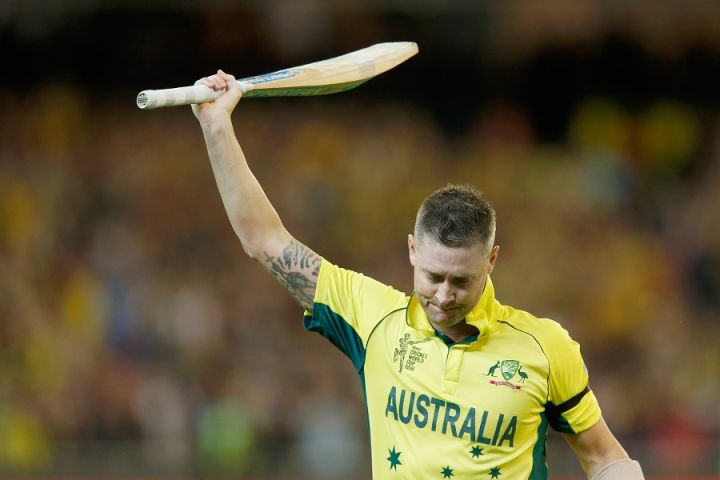5 Things: Clarke and Aussies too good in final, but Kiwis have bright future ahead
Here are five things we learned from Australia's big victory against New Zealand on Sunday in Sunday's Cricket World Cup final:
1. Clarke signs off in style
After needing surgery in December to repair a torn right hamstring, Michael Clarke was in doubt to even make Australia's Cricket World Cup squad, let alone play a significant role with the bat. He wound up missing only the first game of the tournament against England, but made modest contributions throughout pool play. After announcing on the eve of Sunday's final that this would be his last ODI match, he brought his best with a top score of 74 in Australia's chase. It was his biggest score since facing England in September 2013.
Clarke has been a star-crossed figure, not nearly as loved or appreciated as other past or present Australian superstars. His raw numbers, though, are remarkable. He finishes with an average of 44.58, putting him behind only Michael Bevan, Michael Hussey and Dean Jones among Australians with a minimum of 50 games. Clarke is also fourth overall among Aussie scorers with 7,981 runs, behind only Ricky Ponting, Adam Gilchrist and Mark Waugh. Each of those names holds a special place in Australia's one-day cricket legacy, and Clarke has proved he belongs in their company.
2. Passing the torch
Clarke came out to bat with the score at 63 for 2 when New Zealand still had a flicker of hope to pull off a miracle victory, but Clarke and Steven Smith partnered for 112 runs. The 84 minutes they batted together was a bit symbolic, as the outgoing captain batted for the last time alongside the heir apparent to the Aussie cricket throne.

After Clarke departed with nine runs left to win, it was Smith who hit the championship-clinching runs. Clarke was 25 years old when he won his first World Cup in 2007, the same age Smith is today. Smith ended the tournament in spectacular fashion with five consecutive scores of 50 or more runs. It was one more chapter to a career that should one day place Smith in the same category as Clarke, Ponting, Gilchrist and other Aussie greats.
3. Stage fright for Kiwis
Australia's starting XI included four players from their last World Cup-winning squad in 2007 (Clarke, Johnson, Shane Watson and Brad Haddin), and that experience made a big difference. This was New Zealand's first World Cup final appearance, and their predominantly young squad seemed overawed, particularly while batting.
New Zealand still has a tremendous nucleus, and with one or two players moving on, they should target a rematch against Australia in 2019. Australia have proved time and again they have the development model in place to provide consistent success. It's now up to New Zealand to keep pace with them, continue to move forward and grow to be a better side rather than falling away after one humbling defeat.
4. Australia's superhero named Starc
Mitchell Starc was deservedly named Man of the Tournament after finishing as the joint-leading wicket-taker (22) with New Zealand's Trent Boult. Australia's victory was a total team effort, especially on the bowling side, with Johnson, James Faulkner and Glenn Maxwell keeping the pressure on New Zealand.
But it was Starc who stood out each match, regularly intimidating opponents with spells of 90-mph pace and swing. Take him out of the equation, and Australia might have found it much more difficult to get to the final, let alone win the tournament for the fifth time.
5. Blowout reminiscent of a certain Super Bowl run
New Zealand were the Cinderella team of the tournament, entering Sunday's final without a loss. But, with the exception of a 111-run partnership from the Kiwis' Ross Taylor and Grant Elliott, Australia showed they were just too good and in complete command of the match.
New Zealand were the Cinderella team of the tournament, entering Sunday's final without a loss. But with the exception of a 111-run partnership from the Kiwis' Ross Taylor and Grant Elliott, Australia showed they were just too good and in complete command of the match.
The story arc reminded us of the 2000 New York Giants, who were frequently referred to as a team of destiny after a late-season run netted them home-field advantage in the playoffs. And despite a dramatic victory against the Philadelphia Eagles in the divisional playoff round and a near-flawless 41-0 NFC Championship Game win over the Minnesota Vikings, the Giants' fairy tale came to an abrupt end against the Baltimore Ravens in the Super Bowl.
New Zealand's dreams were similarly crushed by Australia's superior defensive effort. Bowlers Starc and Mitchell Johnson were outstanding in the early part of the match before Faulkner hurt New Zealand's comeback hopes with two wickets in three balls at the start of the batting power play in the 36th over. Once Australia came out to bat, it was a clinical performance from the No. 1-ranked team in the world.
Peter Della Penna is ESPNcricinfo's USA correspondent. @PeterDellaPenna
Read in App
Elevate your reading experience on ESPNcricinfo App.